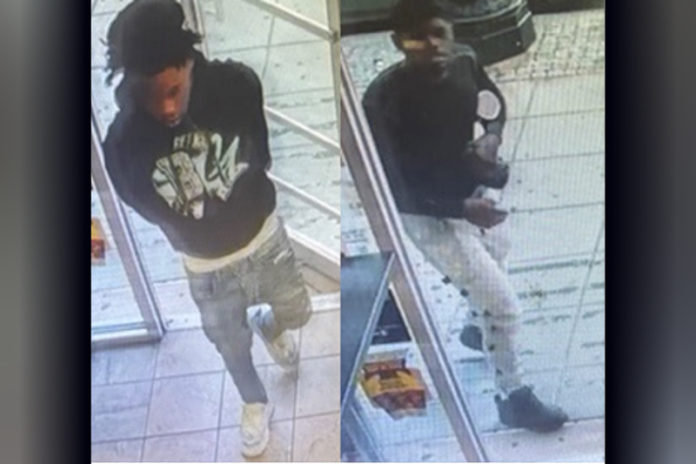 100vw, 800px” data-recalc-dims=”1″><figcaption id=) The suspects in the anti-gay assault in Shaw – Photo: Metropolitan Police Department
The suspects in the anti-gay assault in Shaw – Photo: Metropolitan Police DepartmentThe Metropolitan Police Department released surveillance photos of two suspects who allegedly assaulted a gay couple this past Sunday.
MPD is asking for the public’s help in identifying the alleged assailants. Anyone with information about the attack is asked to contact police by calling 202-727-9099 or texting the department’s tip line at 50411.
As first reported by Metro Weekly, the couple were walking southward on 7th Street NW, in D.C.’s Shaw neighborhood, around 5:40 p.m. when they passed by a group of five male teenagers and two female teenagers. The males, believing the couple to be gay, began calling the two men “monkeypox f*****s” and making homophobic comments about them.
One of the teenagers then approached the couple from behind, striking one of the men in the face two separate times, causing him to fall to the ground and breaking his glasses in the process. A second teenager struck the second victim, splitting his upper lip and forcing him to get stitches at a local emergency room.
The suspects eventually dispersed, with the two primary assailants fleeing northward on 7th Street on foot after a bystander called police, who arrived on scene within minutes.
An MPD spokesperson told Metro Weekly that the case is being investigated as a possible “hate crime,” meaning the assailants, if caught, prosecuted, and found guilty, could face additional penalties beyond those for simple assault.
According to crime statistics from MPD, as of June 30, there were 23 reports of suspected hate crimes motivated by bias or hatred based on a victim’s sexual orientation this year, up from 17 during the same period last year.
Hate crimes motivated by sexual orientation hit a high of 60 in 2017 and 2018, but had declined in recent years, falling to 38 in total during all of 2021.
D.C. Mayor Muriel Bowser tweeted a statement offering support to the victims and saying she was “extremely disturbed” by the attack, reports ABC affiliate WJLA.
“Whenever a hate crime happens in our city, it is our collective responsibility to understand the role we each play in building a safer community for every person who lives in and visits D.C.,” Bowser said.
“We must stand up for our friends and neighbors, especially right now when there is too much anti LBGTQ+ rhetoric sweeping our nation. We must call out the people in our circles if they promote hateful or ignorant ideology, especially right now when people are using public health to stigmatize and discriminate against members of the LBGTQ+ community.
“We hold our D.C. values dear, but protecting and advancing our values is a collective and intentional effort.”
I am extremely disturbed by the reported hate crime that happened in DC this weekend, and I send my support to the victims.
It is our collective responsibility to understand the role we each play in building a safer community for all who live in and visit DC.
My full statement: pic.twitter.com/cMNcPXDH3U
— Mayor Muriel Bowser (@MayorBowser) August 9, 2022
As monkeypox cases increase in D.C., some have worried that gay men — who constitute 98% of those affected in the current outbreak — may be targeted for harassment or violence, much in the same way that Asian-Americans were during the height of the COVID-19 pandemic. Public health officials have warned against stigmatizing those infected with the virus, arguing they need assistance and compassion.
“This is not a disease of the LGBTQ+ community,” Dr. LaQuandra Nesbitt, the director of DC Health told CBS affiliate WUSA9, while also acknowledging that the majority of cases in the District have occurred among men who have sex with men.
“It’s important that we do not create stigma at this time, and we encourage individuals to be on the lookout for symptoms,” Nesbitt added.
Monkeypox, which results in a rash and pus-filled lesions on the skin at various points on the body, is generally transmitted from person to person through direct contact with the rash, scabs, or bodily fluids of an infected person.
The virus that causes the disease can be spread through skin-to-skin contact between people, including sex, kissing, and hugging, through respiratory secretions during prolonged face-to-face contact or through fomites, or through items such as towels and bedding that have touched the lesions of an infected person.









